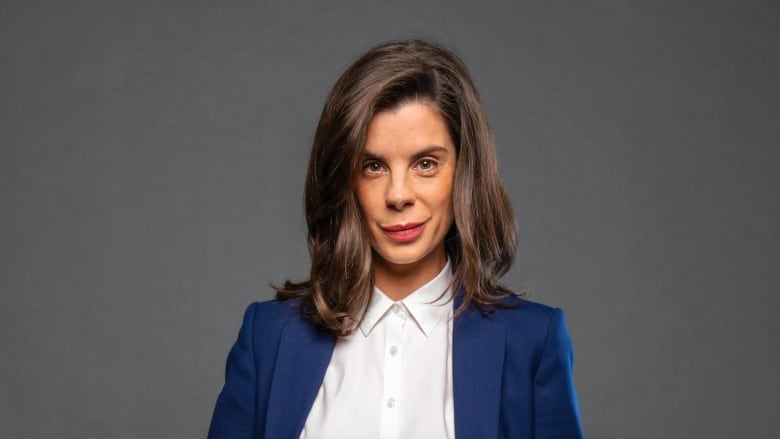'Improvisational Queen' Meredith MacNeill gets physical on Pretty Hard Cases
The Baroness star is now a pantsuit-obsessed detective on CBC’s new buddy-cop dramedy.

You may know Meredith MacNeill as a star of the CBC's award-winning, women-led sketch comedy series Baroness von Sketch Show (BvSS).
"Yeah, I was always getting naked and jumping around," jokes MacNeill of her work on the show, which ended its run this season.
As a true star performer who began her acting career in theatre, MacNeill takes physical comedy to new lengths and according to BvSS writer Nelu Handa, "Meredith is an improvisational queen."
After taking on many personalities on Baroness, she's now committing to one role: the Guns and Gangs Detective Samantha Wazowski in the new female buddy cop drama Pretty Hard Cases premiering Wednesday at 9 p.m. on CBC and CBC Gem.
MacNeill's character Sam is rule-abiding, optimistic, over-achieving... one might even call her annoying.
"I am that character that over-shares that talks a lot, and that is all about law and order," says MacNeill.
"[Sam Wazowski] loves a five point plan. She likes people to be on time. She loves a pantsuit. She loves a sturdy shoe," she adds.

For the lonely, divorced single mother, work is the one thing Sam's got under control until she's forced to work with her department's finest from the Drug Squad, Kelly Duff. Radical differences aside, Sam's unlikely friendship with Kelly may be exactly what she needs to help her find a balance between her professional ambitions and disastrous personal life.
"Meeting Kelly Duff (Adrienne C. Moore), she sort of opens up her own idea of what law and order is, and what it is to be a cop and how to approach each case," says MacNeill.
Much like her character, MacNeill was inspired by her co-star
Because of her background in sketch, physical comedy and improvisation, it makes sense that MacNeill would create her character as she got comfortable with her co-star.
"I think that no matter how much research I did, the real inspiration was when I met Adrienne," says MacNeill.

"It was from exploring with her who these cops were that really set me on a new path of what Sam would be," says MacNeill.
"We were fortunate to talk to two female detectives. That was really integral for both of our development and the characters. They really helped solidify some questions that we had, and approached some subject matter which I was surprised by, so I felt like that was a turning point."
How MacNeill prepares for physical comedy
The relationship between physical comedy and MacNeill's characters is one that she likes to start very early.
"I think I embody all of my characters, and every time I approach a piece of text or even writing is by asking, 'How does this person move through the world?" says MacNeill.
"When I was doing sketch comedy in Baroness, there was an opportunity to play physicality in a certain way and amplify it. The roots of what it is to physicalize a character starts from a place of vulnerability and having empathy for that character. For Sam, that would probably be the thing that I brought over."

Costar Moore says MacNeill's physicality was very remarkable to watch.
"Oftentimes when people think about physical comedy they think big, gaudy and slapstick," says Moore.
"I think what Meredith brought in terms of the physicality of her character was in embodying her vulnerability, insecurity, but also the confidence in her ability."
MacNeill hopes the first season brings joy
"I hope in some small way, we can offer [the audience] a bit of lightness and conversation that they would like to engage in," says MacNeill.